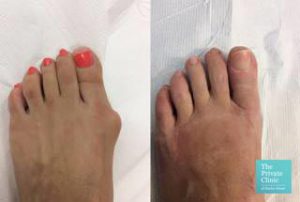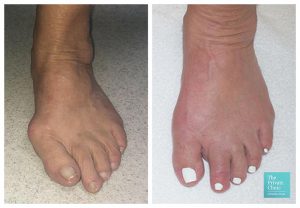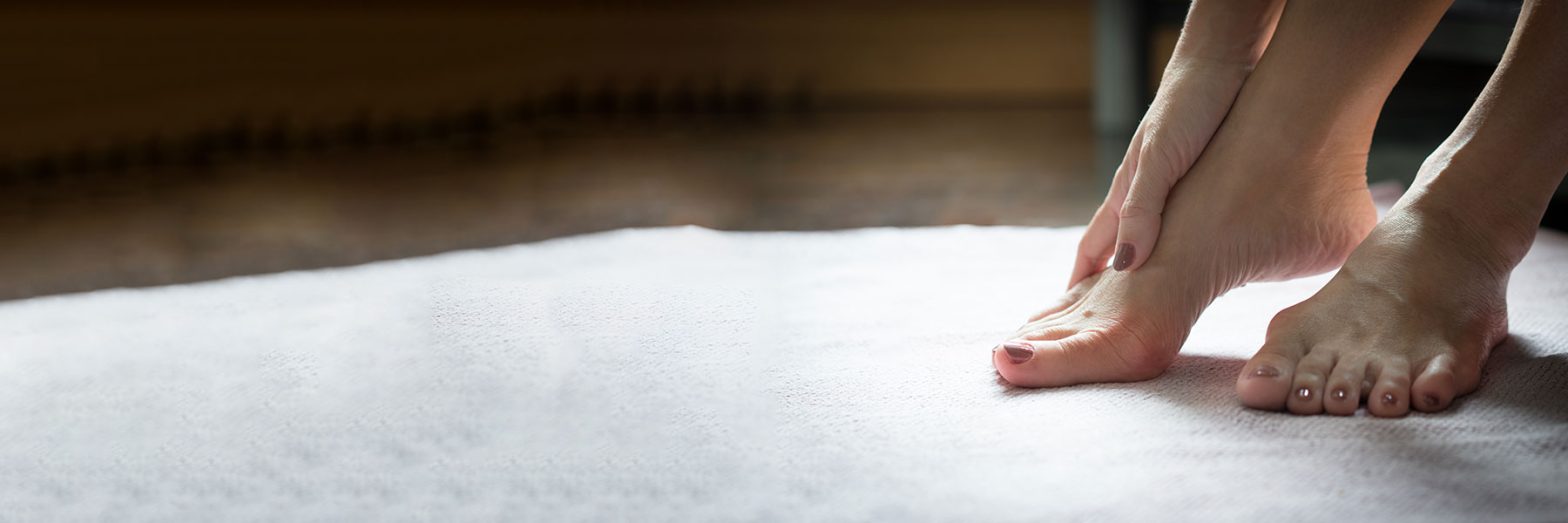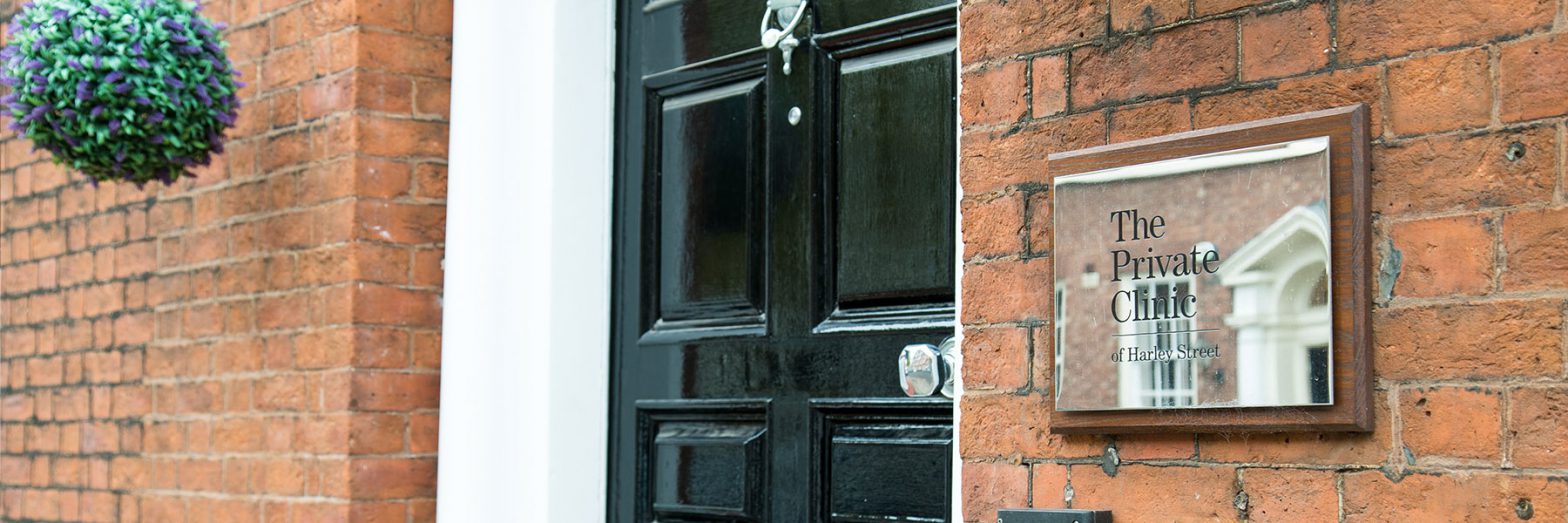Top 10 Bunion FAQs
BUNION SURGERY
According to the largest study in the UK of people affected by bunions it has been estimated that 30% of the UK suffer from bunions of varying degrees and even some favourite celebrities such as Dame Helen Mirren, Oprah Winfrey and Amal Clooney have been photographed wearing shoes with some protruding bunions.
Getting bunion correction surgery has traditionally required a long recovery time with a lot of that spent off your feet which is why many busy, working people do not have the ability to go ahead with it.
Bunions are not only a cosmetic issue but can however cause pain and discomfort and here at The Private Clinic we are able to offer patients a minimally invasive bunion correction procedure with a quick recovery time and the ability to walk immediately after the procedure.
We see many patients in our bunion clinic in Harley Street all armed with plenty of questions about bunions themselves and our exclusive new procedure.
We have answered 10 of the most popular ones below;
Top 10 Bunion Frequently Asked Questions
-
What is a bunion?
A bunion is a deformity in the foot that causes what appears to be a boney lump protruding from the side of your foot next to your big toe. This lump is not essentially a growth but the big toe joint protruding out from the side of your foot. Bunions come in different forms from very mild to more severe cases where the big toe instead faces into the foot and often causes hammer toe which is another deformity that causes your toe to bend or curl downward.
-
What causes bunions?
Bunions are usually caused by an inherited faulty structure of the foot. This means that if someone in your family has bunions then it is likely that you may develop one too. It is not the bunion itself that is inherited; more so the foot type that can make you more prone to developing them. Another cause of bunions can come from wearing ill-fitting and uncomfortable footwear but this is usually in partnership with the anatomy of your foot rather than being the sole cause.
-
Do I have to treat my bunion?
Bunions come in different sizes and if your bunion is relatively small and not causing you any pain or discomfort then you may not feel the need to have surgery. It is worth noting that many bunions do increase in size over time but the time in which this develops varies between individuals. As bunions become larger they can start to interfere with daily activities like your balance, walking, wearing shoes and taking part in sporting activities so we would always recommend seeking medical advice when you first start to notice the signs of one.
-
How do you treat bunions?
There are many different ways to treat a bunion. Non-surgical bunion ‘treatment’ options often do not help to treat the bunion but help to alleviate the symptoms of a bunion such as bunion pads which can reduce the pressure felt on a bunion when wearing shoes. The only way to treat a bunion is to have a surgical procedure called a bunionectomy. There are lots of different bunionectomy techniques but here at The Private Clinic, we are able to offer our patients our exclusive minimally invasive bunion removal surgery. Our bunion removal procedure was originally developed by Orthopaedic Consultant Surgeon, Dr Bianchi and is inspired by keyhole surgery techniques. It is a quick mini-invasive surgical procedure that doesn’t involve any fixative devices such as screws, plates or wires and patients are able to walk on the foot the same day.
-
Can I get bunion treatment on the NHS?
It is possible to get bunion removal surgery on the NHS however many hospitals will only operate for extreme bunion cases. Bunionectomy surgery on the NHS often requires being on a waiting list that can take a considerable amount of time to firstly be referred from your GP to finally being deemed suitable and in-need of the surgical procedure. NHS bunion surgery is also very invasive and often uses fixative devices such as screws, plates or wires which results in an increased amount of downtime. Patients can expect anywhere from 2-6 weeks where you will need to be off your feet meaning a large amount of time off work.
-
Is bunion surgery painful?
Minimally invasive bunion correction surgery at The Private Clinic is performed under a local anaesthetic which will continue to last for some time post-procedure. Most patients do not feel any significant amounts of pain post-procedure and any pain felt can be easily managed by painkillers such as paracetamol.
-
Will I be able to walk after bunion surgery?
Our revolutionary new bunion correction surgery available exclusively in the UK at The Private Clinic allows patients to be able to walk almost immediately after their procedure. We encourage our patients to place their foot flat on the ground and regularly walk around to encourage the bones to heal to the correct physiological readjustments. Patients leaving our hospital after having minimally invasive bunion surgery do not require the need for crutches. However, you must always take care not to tire or overload your foot. You will still need to rest it, by sitting with the foot raised.
-
How long is the recovery after bunion surgery?
You will be able to see the final results from bunion correction surgery immediately however swelling may occur in the meantime. You can expect the foot to be fully healed within 3-6 months. Still, as mentioned above, you will be able to return to your usual activities relatively quickly post-procedure meaning minimum downtime.
-
Will my bunions return after surgery?
Our geometric method of bunion correction surgery means it is far less likely for your bunion to reappear when compared to traditional surgical methods that use soft tissue. However, bunion reoccurrence is not impossible and your surgeon will discuss this along with all the risks and complications associated with bunionectomy surgery at your consultation.
-
When can I wear normal shoes / high heels again?
When you leave the hospital following bunion correction surgery at The Private Clinic, you will be wearing a specialised orthopaedic shoe which will be provided to you. At your follow-up appointment, your surgeon will be able to let you know when you can stop wearing this and go back to your usual shoes. We would recommend that you wear comfortable and well-fitted shoes to allow your foot to continue to heal properly. High-heeled and wedged shoes can be worn 2 months after surgery.


Why choose The Private Clinic for Bunion Removal Surgery?
- Exclusive to The Private Clinic in the UK, there is no other operation like this one.
- Bunion Removal Surgery is performed under local anaesthesia using keyhole techniques.
- This is the only natural operation with no metal fixtures such as wires or screws being used.
- There is a 98% success rate following the bunion operation
- Orthopaedic Consultant Surgeon, Mr Bianchi is an expert in his field and has been carrying out bunion operations for 15 years
- Dr Bianchi carries out on average 1,200 bunion operations a year
- You will be able to bear weight on your foot shortly after surgery when advised to by your surgeon
- No need for an overnight stay
- Minimal post-operative pain and aftercare.
- Treatment carried out in our state of the art London Fitzroy hospital
- 24 hour patient helpline direct to your nursing team and surgeon, which means should you have any concern we are here to help.
- Dedicated post-operative care and appointments with your surgeon and nursing team. We are here to give you the best experience.
- Our excellent reputation for patient safety and satisfaction, honest advice and outstanding care means your journey with The Private Clinic will be an exciting experience to a newfound confidence.
- View our gallery of before and after results.
To find out more about our minimally invasive bunion correction procedure or to book an appointment at our Harley Street Bunion Clinic please call 0333 920 2471 or click here to book bunion correction procedure consultation.






